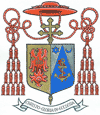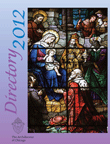
The Cardinal's Column
Francis Cardinal George, O.M.I.
Catholic teenagers in the U.S.:
good news and bad
Cardinal George's Schedule
- July 9 - 14: Vacation
- July 15: 5 p.m., 110th Anniversary Mass of Knights of Columbus St. Cabrini Council 182, Old St. Mary’s
- July 16: 12 p.m., 50th Anniversary Mass, St. Isaac Jogues
- July 17: 10 a.m., Episcopal Council Meeting, Residence
- July 18: 7 p.m., Keynote Address, Colloquium on the Parish, Loyola University Lakeshore Campus
- July 19: 7 p.m., Guest on EWTN Live, Birmingham, Alabama
- July 21: 9 a.m., Management Meeting, Pastoral Center

Cardinal's Appointments
His Eminence, Francis Cardinal George announces the following appointments:
Pastor
Rev. Richard Andrus, S.V.D., to be the pastor of St. Anselm Parish, South Michigan Avenue, while retaining his duties as pastor of St. Elizabeth Parish, effective immediately.
Rev. David Jones, from pastor of St. Ambrose Parish, East 47th Street, to be the pastor of St. Benedict the African East, West 66th Street, effective July 1.
Rev. Freddy Washington, C.S.Sp. to be the pastor of St. Ambrose Parish, East 47th Street, while retaining duties as pastor of St. Mary Magdalene Parish, South Marquette, effective July 1.
Administrators
Rev. Lawrence Choate, OSM, to be the administrator of St. Roman Parish, South Washtenaw, effective July 1.
Rev. Richard Martin to be the administrator of St. John Fisher Parish, South Washtenaw, effective immediately.
Most Rev. Joseph Perry to be the administrator of St. Francis De Sales Parish and St. George Parish, South Ewing, while retaining his duties as Episcopal Vicar of Vicariate VI, effective immediately.
Sabbatical
Rev. Ronald Gollatz, from pastor of St. Francis De Sales Parish, Lake Zurich, to be on sabbatical from July 1 to Dec. 31.
Special project director
Rev. John Jamnicky, from the USCCB Human Mobility Apostolate and Apostolate of the Sea, Washington DC, to direct a special project to establish a new parish in Antioch, with residence at St. Mary of the Lake Seminary, effective July 1.
Incardinated
Rev. Zdzislaw (Jason) Torba, an extern from the Diocese of Lublin, Poland, incardinated into the Archdiocese of Chicago, will continue to serve as the associate pastor of St. Ferdinand Parish, West Barry, effective June 9.
In Poland a couple of months ago, Pope Benedict XVI said to thousands of young people, “In the heart of every young person there is a desire for a full, happy and successful life. Do not be afraid of this desire, do not be dismayed. God the Creator who inspires in young hearts an immense yearning for happiness will not abandon you in the difficult construction of the house called life.”
The Pope expressed what every father and every mother hope for their children as they pray for them daily. A recent national study on Catholic teenagers and their parents, however, brings “very much good news and very much bad news.” The report highlights the huge task of providing Catholic young people with the formation in life, the teaching and direction they need to be Catholic in American society. It can be found as a chapter in a book that examines the religious and spiritual lives of all American teenagers, and that permits comparisons to be drawn between Catholic young people and those of other faiths (Christian Smith and Melinda Denton: Soul Searching: the Religious and Spiritual Lives of American Teenagers, Oxford University Press, 2005).
The study shows that Catholic young people are interested in spirituality and religion and even seem to be keen on experiences of transcendence. They acknowledge in varying degrees that the faith is important in their life and express a general desire to remain Catholic as adults.
Yet the study also shows there are significant gaps in young people’s relation to the Church and in their understanding of revelation and the teachings of the Catholic faith. Young American Catholics emerge as “incredibly inarticulate about their faith, unable adequately to express, even for themselves, what they believe, including the basic teachings of Catholicism.” While young people are indeed interested in spirituality, they have no principle for separating the fake from the authentic. Many end up with what the study describes as “moralistic, therapeutic deism, a religious ‘whatever-ism’.”
By contrast with the children of evangelical Protestants, mainline Protestants and other forms of Christian faith, Catholic young people are less informed about their faith. They are also often living in ways contrary to its teachings, especially regarding sexual morality. Despite the Catholic heavy investment in schools and catechetical programs, the Church as an effective teacher, able to shape life in its daily details, seems largely absent.
Perhaps this disconnect between teaching and action, between faith and life, is a child of the deep divisions among Catholics that Cardinal Bernardin sensed when he began the Common Ground Initiative over 10 years ago. When opinion is so divided, every assertion is relativized, even when it is authoritative in its origin. When, as well, the general culture encourages everyone to think autonomously, especially in matters like religion, which the culture treats as a matter of merely subjective preference, it is not too surprising that young people are not tied closely to the Catholic faith.
Perhaps not too surprising, but certainly tragic, except for those who have spent their lives in a similarly self-constructed box. The final point the study makes is that Catholic young people disconnected from their faith are often reflecting their parents’ Catholicism. While there are many influences on what one believes and how one acts, family remains primary, even in adolescence. The relativizing of the Church and her teaching did not begin with this generation of young people.
Often enough in pastoral experience, younger people experience a sort of conversion, an identification with Christ in his Church during their college years or at marriage or later. There have to be conversions, points of turning from sin to God, in the life of every Christian. But conversion in Catholicism is most often a sacramentally nurtured opening of the heart and the mind to the truth and love of Christ, mediated in the life of the Church and through the experience of her saints and martyrs. This begins in childhood and has its own manifestation throughout an adolescence not trapped in sin.
The report offers material for reflection by parents, teachers, catechists, youth ministers and priests. While it points to many difficulties in handing on the Catholic faith today, it also points to actions that can be taken. Listening to Pope Benedict again, an invitation must be at the heart of any approach to young people in the Church. The Pope in Poland invited young people to build their lives on the rock who is Christ. “He knows us better than we know ourselves and says to us: ‘You are precious in my eyes and I love you.’ He is faithful even when we are lacking in faith, because he cannot deny himself; he constantly looks on the wounded heart of man and says: ‘I do not condemn you; go, do not sin again.’ Do not be afraid to lean on Christ. Long for Christ as the foundation of your life.”
Our young people, like all Catholics, have the means to come to Christ, to know him and love him in personal prayer of adoration and petition, in the Mass and the sacraments, in their love for the Church as Christ’s body and bride, in their prayerful reading of Holy Scripture, in their devotion to the Virgin Mary and their eagerness to be submissive to the action of the Holy Spirit. Enjoying all these gifts of Christ presupposes, of course, that they have the faith, cherish it as a gift and want to live it and share it. The invitation to young people to live Christ’s life in the Church is made effectively only by those who have themselves accepted it; youth ministry begins with the example of adults.
Sincerely yours in Christ,
Francis Cardinal George, OMI
Archbishop of Chicago



